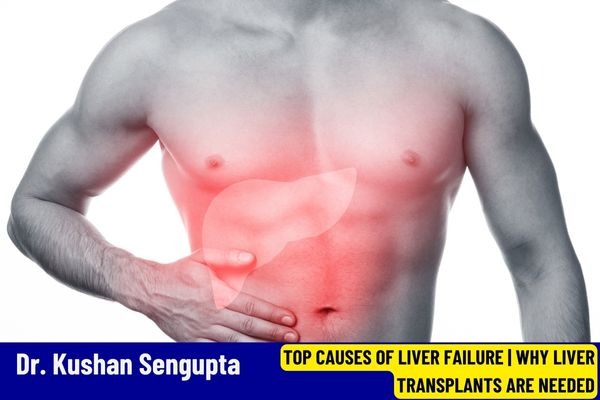Top Causes of Liver Failure | Why Liver Transplants Are Needed
Learn the leading causes of liver failure that may lead to transplantation. Understand risk factors, symptoms, and when to seek help from a liver specialist.


🩺 Top Causes of Liver Failure
Why Liver Transplants Are Sometimes the Only Option
By Dr. Kushan Sengupta | Consultant Transplant Hepatologist
The liver is one of the most vital organs in our body—responsible for filtering toxins, aiding digestion, storing energy, and supporting immunity. But when it fails, the consequences can be life-threatening. Liver failure, whether sudden or slow, often leaves liver transplantation as the only lifesaving solution.
In this blog, Dr. Kushan Sengupta, a leading Transplant Hepatologist, discusses the top causes of liver failure and highlights when a transplant becomes essential.
🚨 What Is Liver Failure?
Liver failure occurs when a significant portion of the liver is damaged and can no longer perform its essential functions. It may happen suddenly (acute liver failure) or gradually over months or years (chronic liver failure).
Without timely intervention, it can lead to complications like:
Jaundice
Bleeding disorders
Brain dysfunction (hepatic encephalopathy)
Organ shutdown
🔍 Top Causes of Liver Failure
1. Chronic Viral Hepatitis (Hepatitis B and C)
Chronic infections like Hepatitis B and Hepatitis C are silent destroyers. Over time, they cause liver inflammation, scarring (cirrhosis), and finally liver failure. Early detection and treatment are key to preventing long-term damage.
2. Alcoholic Liver Disease
Prolonged alcohol use can cause alcoholic hepatitis, fibrosis, and ultimately cirrhosis. Dr. Sengupta emphasizes that many patients only realize the extent of liver damage once symptoms become severe. In late-stage cases, transplant is often the only solution.
3. Non-Alcoholic Fatty Liver Disease (NAFLD/NASH)
Due to rising obesity and diabetes, NAFLD is now a leading cause of liver disease worldwide. When fat buildup in the liver leads to inflammation (NASH), it can progress silently to cirrhosis and liver failure.
4. Autoimmune Hepatitis
This occurs when the immune system mistakenly attacks liver cells. If left untreated, it leads to chronic inflammation and cirrhosis. Immunosuppressive therapy can help, but advanced stages may still need transplantation.
5. Drug-Induced Liver Injury (DILI)
Common drugs like paracetamol (acetaminophen), certain antibiotics, and herbal supplements can cause sudden, severe liver damage. In acute cases, immediate transplant evaluation is crucial.
6. Genetic & Metabolic Disorders
Inherited conditions like:
Wilson’s disease (copper buildup)
Hemochromatosis (iron overload)
Alpha-1 antitrypsin deficiency
can damage the liver over time, often requiring transplant in advanced stages.
7. Biliary Diseases
Conditions like primary biliary cholangitis (PBC) and primary sclerosing cholangitis (PSC) cause chronic inflammation and bile duct damage, leading to cirrhosis and liver failure.
⚠️ When Is a Liver Transplant Needed?
According to Dr. Kushan Sengupta, a liver transplant is considered when:
Liver function is severely impaired (MELD score is high)
The patient has decompensated cirrhosis (jaundice, fluid buildup, encephalopathy)
No other treatment options are effective
A timely referral to a transplant hepatologist ensures better outcomes and a higher chance of survival.
🧠 Early Symptoms to Watch For
If you notice any of the following signs, consult a liver specialist immediately:
Persistent fatigue
Jaundice (yellowing of eyes and skin)
Abdominal swelling
Nausea, loss of appetite
Confusion or forgetfulness
Easy bruising or bleeding
👨⚕️ Expert Tip from Dr. Kushan Sengupta
“Most liver failure cases can be prevented with early intervention, lifestyle changes, and regular monitoring. A liver transplant should never be seen as a last-minute rescue—it’s a planned, life-saving option when managed well.”
🌟 Final Thoughts
Understanding the causes of liver failure empowers you to take control of your health. Whether it’s viral hepatitis, alcohol, or metabolic disease—early diagnosis and treatment can prevent the need for a liver transplant. And when transplantation becomes necessary, expert care from a transplant hepatologist like Dr. Kushan Sengupta makes all the difference.